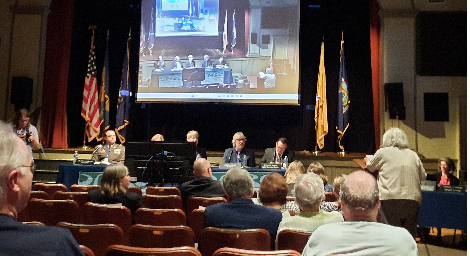Natural Gas Politics
May 28, 2009Bill to repeal the exemption for hydraulic fracturing in the Safe Drinking Water Act
June 9, 2009By Jon Hurdle, Reuters, Fri May 29, 2009 4:07pm EDT
May 29 (Reuters) – Opponents of natural gas drilling in the U.S. northeast on Friday welcomed new restrictions by an interstate regulator requiring prior approval for any new projects in the Delaware River basin.
Energy companies and their trade association criticized the new regulations and said they would need to study the ruling to determine what impact it would have on plans to exploit gas reserves that form part of the massive Marcellus Shale formation in Pennsylvania and parts of surrounding states.
The Delaware River Basin Commission said on May 19 that energy companies must obtain its approval before beginning extraction.
There is no current gas development in the area covered by the measure, although the commission has received about 100 applications from energy companies, said Clarke Rupert, a spokesman for the organization.
The action — which precedes a formal rulemaking — may slow development of the Marcellus Shale which is said to contain enough gas to meet U.S. needs for a decade or more.
The commission, representing Pennsylvania, New York, New Jersey, Delaware and the federal government, said its action reflects concern about the potential for damage to water quality in a 197-mile, non-tidal stretch of the river from Hancock, New York to Trenton, New Jersey.
DRBC Executive Director Carol Collier “determined that as a result of water withdrawals, wastewater disposals and other activities, natural gas extraction projects in shale formations may individually or cumulatively affect the water quality of Special Protection Waters by altering their physical, biological, chemical, or hydrological characteristics,” the organization said in a statement.
The measure was hailed by critics of gas drilling who say the new “hydraulic fracturing” technique for gas extraction is contaminating groundwater with a cocktail of chemicals, some of them carcinogenic.
Activists have been particularly concerned about the possibility of pollution in the Delaware River watershed which supplies some 15 million people.
People living near drilling sites in Pennsylvania and other states have suffered from rashes, vomiting, and discolored water, while animals have died and some wells have been polluted with escaping methane, critics say.
“This is a first,” said Barbara Arrindell of the Pennsylvania anti-drilling group Damascus Citizens for Sustainability. “No other geopolitical entity in the field of gas drilling has stepped forward” to restrict gas drilling.
Tracy Carluccio, deputy director of the Delaware Riverkeeper, a nonprofit environmental group, said the commission’s action goes beyond the rules imposed by individual Pennsylvania or New York regulators, who activist accuse of treating energy companies too leniently.
“We think there should be some positive trickle-down on other agencies,” Carluccio said.
Matt Pitzarella, a spokesman for Range Resources Corp (RRC.N), a leading gas driller in Pennsylvania, said the action does not affect Range which has no current plans to drill in the affected area. He said it imposed unnecessary restrictions in an area that is already regulated by individual states.
Steve Rhoads of the Pennsylvania Oil & Gas Association, a trade group, said the commission’s action had come sooner than he expected, and said his members would be seeking clarification from regulators.
“Our primary concern is to make sure that whatever they do accomplishes their goal as well as ours,” he said.



